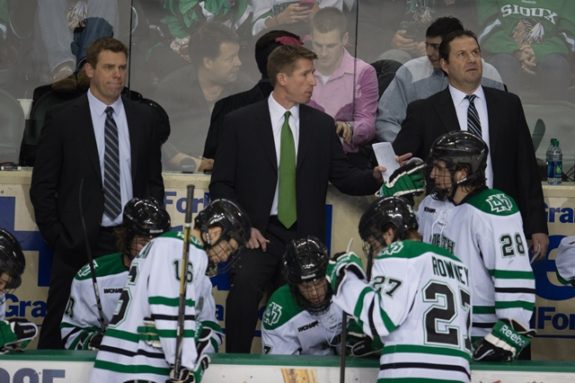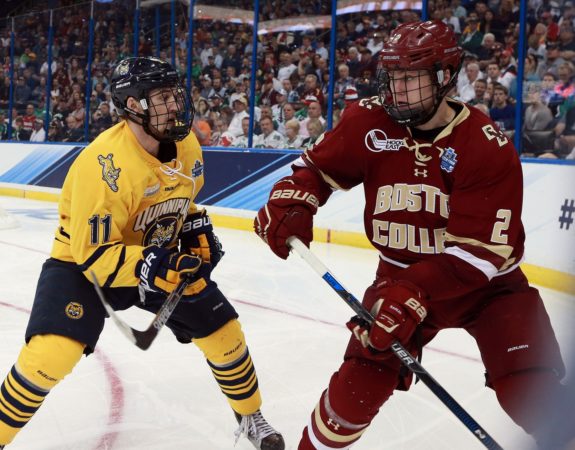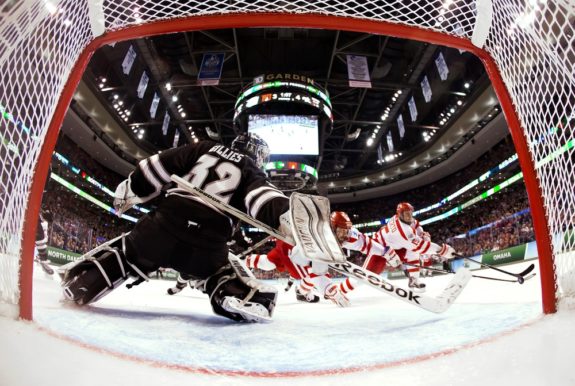Compared to other major North American sports, college hockey lacks influence and attention, as the sport’s top talents are already either playing professionally or in a multitude of major-junior leagues. College hockey may not carry the same weight as college football or college basketball in developing their sport’s next young stars, but a good portion of NHL players have gone through the NCAA. If the state of California has its way, the NCAA is about to look very different.

No matter the sport – whether it be hockey, baseball, basketball, football, etc – the debate rages on: should college athletes get paid? California has passed a bill that makes that dream closer to reality. Understandably, the NCAA isn’t necessarily happy about it and is willingly to go to great lengths to fight it.
The Bill
The bill allows college athletes to earn money as a direct result of their college sports participation. No, it does not mean that schools will pay athletes in the manner of professional athletes, but it will allow student athletes to profit from their name and likeness, as in endorsement deals and hiring agents, both forbidden by the NCAA.
While the bill has yet to become official law, it’s received unanimous support from California lawmakers and vocal professionals such as Lebron James. The NCAA sees it as an affront to the legitimacy of their amateur sports operations. While the NCAA claims the bill would blur the ever-shifting line between professional and collegiate sports, supporters of the bill are quick to point out the lofty revenues some schools earn.
The Short-Term Effects
If this bill is passed, although its status is still up in the air, it wouldn’t take effect until 2023. In fact, it’s likely the college athletes of today will not reap its benefits. Even if the bill becomes law, from the fan’s perspective at least, it will be business as usual for the next few years. Meanwhile, behind the scenes, the NCAA will be expressing every option to challenge the new law in court. Sports recruits will be hiring agents and brainstorming ways to cash in on their potential stardom.

For fans of college hockey, the immediate effects will be even less noticeable for two reasons. First, the current bill would amend state law, affecting only California and California-based student athletes. The state of California lacks a single NCAA sanctioned college hockey program, either at the Division I or Division III levels. Second, college hockey players aren’t as marketable as their football and basketball counterparts. Simply put, if you generated enough buzz as a hockey player at age 18, 19, or even 20, chances are you’re already playing professionally.
The Long-Term Effects
Basketball and football will be the first, and most affected, by any possible changes. After the dust settles between those sports, the influence of this new bill will begin to reach the sport of hockey. How the sport is impacted depends on if the new California law is adopted by other states. College hockey players will fall under the laws of the state in which their school is located. If the bill passes, it’s hard to imagine that other college athletes in different states won’t be pushing for the same.

For hockey, the impact will seem more local and concentrated, as college hockey is a more specific, regional draw. While college hockey players may not have the same national attention as basketball and football, endorsement and marketing opportunities in college hockey hotbeds such as New England and Minnesota are sure to be valuable. You can also expect that any revenue generated from this new law will be less than other sports, and endorsements are more likely to be at a local level, as opposed to national.

As for the expansion of college hockey, this new law could have an unintended effect. Assume the law takes effect, but California is the only state to adopt it. While most college hockey programs remain concentrated in Northeast and Midwestern USA, college hockey is beginning to take hold in the sunbelt states and out west. Last season, Arizona State made the NCAA Division I Ice Hockey Tournament for the first time, only a mere three years after its inaugural season. If hockey continues to expand west and into California, instead of taking their talents to storied hockey schools such as the University of Minnesota, Boston College or Boston University, prospective players may opt for the sunny shores of California so they can cash in.
International Effects
A quick look at the bill doesn’t seem to expressly forbid student athletes from earning revenue from international companies. This seems perfect for college hockey players, who might seek endorsements from America’s friendly neighbor to the north, Canada. While Canadians might remain more interested in their own leagues, such as the major junior leagues that dot their landscape, a number of college hockey programs feature Canadians. They could earn some valuable endorsement dollars before their academic career is over, even if they lack the fame of their counterparts. To summarize, California’s proposed law is years away from going into effect if it passes. And, even if it does pass, its impact on the current college hockey landscape will be minimal. However, its lingering effects could cause interest in college hockey to shift, and possibly lead to income for student athletes.